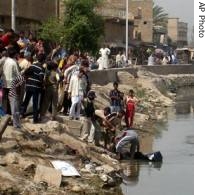2007年VOA标准英语-Iraqi Police Find Body That May Be Missing US S(在线收听)
Mosul
23 May 2007
The U.S. military is trying to determine if a body found in the Euphrates River south of Baghdad is one of three missing U.S. soldiers. Elsewhere in Iraq, suicide bombs, roadside blasts, and gunbattles killed at least 29 people, including seven U.S. soldiers and two Marines. VOA's Barry Newhouse reports from Mosul.
Top U.S. military spokesman General William Caldwell confirmed that investigators are trying to determine if the body found in Babil province is one of the three American soldiers who have been missing since May 12.

Iraqi men and a policeman try to pull a body from the Euphrates River at Musayyib, Iraq, 23 May 2007
An Iraqi man who watched as the body was pulled from the river told reporters what he saw.
He says two bodies were recovered from the river, and one of them was beheaded. He said one of the bodies was in a U.S. military uniform and bore signs of torture.
Al Qaida in Iraq claimed responsibility for the kidnappings, but has provided no proof. Thousands of U.S. and Iraqi troops have been searching palm groves, swamps and rivers in the rural area south of Baghdad for the missing soldiers. Several patrols have been attacked while searching through the Sunni-majority area.
In violent Diyala province, a suicide bomber struck a café in the town of Mandali near the Iranian border. In Baghdad and in al Anbar province, U.S. officials said roadside bombs and gunbattles killed at least nine American troops.
General Caldwell told reporters in Baghdad that the military expects more fighting as American and Iraq troops conduct more operations targeting insurgents and terrorists.
The general says coalition forces have conducted 45 operations against al Qaida in the past week, killing 19 terrorists and detaining 88 suspected terrorists. General Caldwell also said soldiers discovered al-Qaida hideouts near the town of Karma northeast of Fallujah.
"These locations also turned out to contain torture chambers," he said. "Al Qaida was using these houses to hold kidnap victims and torture them, to try to intimidate people into cooperating with them and to submit to their desires."
American and Iranian diplomats are scheduled to meet Sunday in Baghdad for talks on improving security in Iraq. During two regional conferences on Iraq in recent months, representatives from the two countries had little contact.
But Iraqi government spokesman Ali Dabbagh says his country has paid a price because of tension between Iran and the United states.
"We do not want Iraq to be an arena of fights between two sides and we do not want Iraq to be an arena for sending messages between two countries. This is what the Iraqi government wants," said Dabbagh.
Dabbagh says Iraqi officials hope Sunday's meeting will be a starting point for improving relations among Iraq's neighbors.